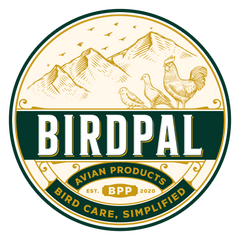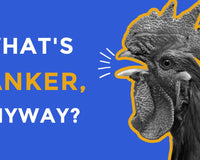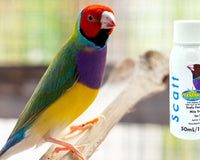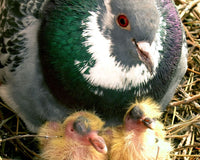As breeding season quickly approaches for pigeons, cage & aviary birds, and chickens (later in February), we are prepared to receive the constant and innocent question: "Do my birds need calcium?" While there are a few aspects of bird husbandry and care that can be overlooked, supplementing your birds with calcium, especially while breeding, is absolutely crucial and necessary.
What is calcium & why do my birds need it, anyway?
Calcium is one of fifteen minerals needed in a bird's diet in order to maintain proper health, and it is arguably the most important. It is the mineral that is essential for life since it strengthens the skeletal system and builds bones, allows muscle contractions (including those of the heart) and nerve activity, alters the hormonal state during breeding, and is needed by the hen to form eggs. Calcium, however, is unfortunately not made by the body so it needs to be supplemented-- more on that later.
Calcium builds bones and strengthens the skeletal system: young birds need it since they are continuously developing their skeletal system in the amniotic egg and after they hatch. A lack of calcium in a young bird's body will then trigger it to reabsorb the calcium already found within its bones, leading to a weakened, underdeveloped skeletal system.
It allows for nerve and muscle activity: calcium deficient birds appear weak and find it difficult to walk, which is at times mistaken for Paratyphoid. Lack of calcium also weakens the oviduct, which is muscular tissue that allows the hen to push down the egg, resulting in egg binding.
It alters the bird's hormonal state during breeding: regular calcium supplementation in the bird's body allows for the hormones estrogen, parathyroid, and Calcitriol (Vitamin D3) to efficiently control and regulate calcium absorption in the tissues and bones, especially during times of breeding when adult birds are using their calcium reserves on a regular basis.
It is needed for egg production: an egg is made of about 95% calcium, which means that a regular supplementation of it needs to be ingested by the hen. This is especially true when laying in multiple rounds, or in some chickens, all year long.
Symptoms of calcium deficiency
Some common symptoms shown by calcium deficient adult and young birds are:
- egg binding in adult hens
- difficulty walking, appear weak, and have reduced vigor
- production of crop milk deteriorates, which then leads to less milk being fed to the youngsters, resulting in malnourishment
- formation of rough shell eggs (pictured below) or mineral-lacking soft-shelled eggs
- bent keels in the young birds (a result of the skeletal system being underdeveloped) which is caused by adult parents sitting on them to tightly
- cloacal collapse- since the hen's oviduct is weakened, it strains itself to push the egg out resulting in the cloaca exposing itself inside-out

Recommended calcium supplements
Pickstones, pickpots, pink/red minerals, and a very complete, good-quality grit (containing oyster shell, redstone, and limestone) are all great products to feed your birds. Perhaps more importantly, supplementing them with a liquid calcium gluconate or powdered calcium (for cage & aviary birds) about 2-3 times per week in their drinking water will be most beneficial. For pigeons, providing the breeders with Dac's Greenline Breeding Tablets will also help since they contain aminos, proteins, and trace elements which are also necessary for the young birds to thrive.

Calcium sounds like a simple and insignificant mineral but it's obviously necessary for successful egg production, regulating hormonal state, aiding in nerve and muscular function, and building strong bones. Ultimately it's up to you, the fancier and enthusiast, to keep a close eye on your birds and practice a routine that'll lead to a successful breeding season with healthy young birds.










